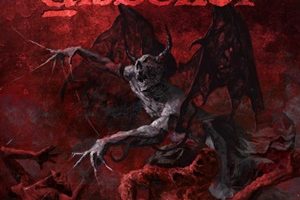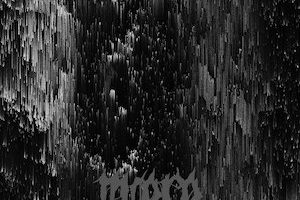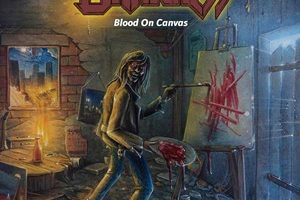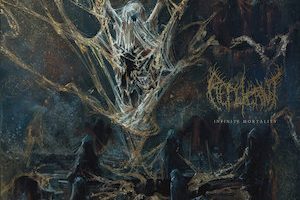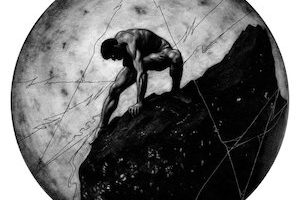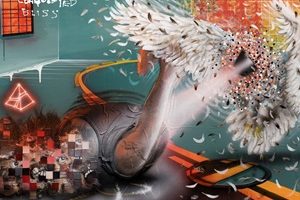Avarice – Lurking in the Trenches
Tuesday, 20th June 2023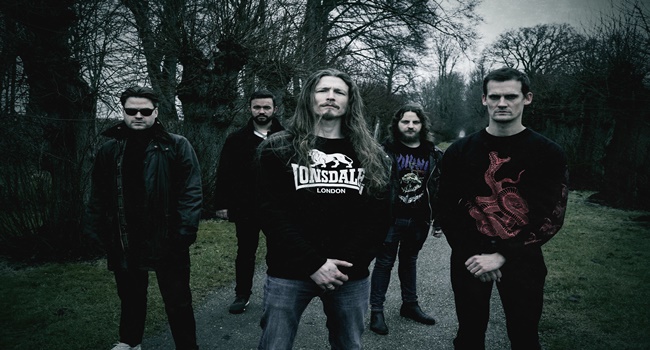
We’ve seen quite a proliferation of younger acts pushing multiple subgenres into a sound that is energetic, attacking, while also developing the key components for hook/groove retention. Hailing from Denmark, Avarice originally hit the scene in 2006-08 as teenagers, only to fall apart and join other acts. Returning to the scene during the pandemic, their Reborn in Blood EP from March 2021 allowed the band to gain the attention of Target Records who would sign the band to their sub-label Uprising! Records for this year’s self-titled debut album release. For those of you who love a great fusion of death/thrash with the right groove sequences, this record should go down a storm – especially if bands like Hatesphere, Sepultura, Slayer, and Power Trip mean anything to you.
This talk with guitarist Troels Rasmussen covers the outlook on the debut album, working with producer Chris Kreutzfeldt and his insight to make the final record even stronger, special video shoots in a castle basement, the band’s love for all things Slayer on record and live, the work/music/life balance, plus future plans in the next year.
Dead Rhetoric: What are some of your earliest memories surrounding getting into heavy music for childhood? And when you did want to pick up an instrument and start performing your own music?
Troels Rasmussen: Wow. It’s different for all of us, but I think it was in the early teen years we were introduced to the Danish metal scene. All the big bands coming out of here like Hatesphere – and eventually the big ones that they were inspired by like Slayer, Sepultura, and so forth. Then we got inspired from that, so it’s pretty basic in that way. When it came to the instrument part, it went pretty much hand in hand with the music. We all picked up instruments as teenagers, except for Anders when it came to his growling vocals.
Dead Rhetoric: Did you have any formal lessons at your instrument?
Rasmussen: I started playing on an acoustic guitar, which most kids do. I finally listened to metal, and then I switched over to electric, which was more fun.
Dead Rhetoric: Your self-titled debut album is coming out so many years after your initial start as teenagers. What circumstances took place behind the scenes to restart the group – and do you believe these ten songs reflect musicians who benefitted from more seasoning and experience to make this record stronger in the end?
Rasmussen: Yeah, of course. It was different circumstances, as I got into the band during the latter stages with the guys. The other guys were playing together in their late teens, and they couldn’t quite make it work out. They started to also pursue other projects, which definitely interfered with the band. Getting the people together again was amazing, the drive and fire again. It was a thing that everyone had been missing. Then coronavirus hit, we did the debut EP – it was a trial to get together in this world. From there we did the debut album, it’s a much more serious thing working with the tracks. It’s well-balanced, very well-structured, I think the EP in 2021 was more of a trial thing. Our approach to this album has been much more serious, and I hope that people can hear this in the final product.
Dead Rhetoric: Were you working on the album independently before signing with Uprising! Records?
Rasmussen: We really wanted to keep this old school – we did record the album independently and then circulated it around. Target/Mighty Music became very interested, and that’s how we got the deal with Uprising!, which we are very happy with. They have a great base to be able to circulate our (material) internationally, and that’s how it came around. We just wanted to make a record, and luckily someone was nice enough to sign us.
Dead Rhetoric: Were there any surprises, obstacles, or challenges that came up during the recording process for the record?
Rasmussen: No, it was pretty smooth. We did the song structures and had them finalized when we hooked up with Chris Kreutzfeldt, he has done quite a few big albums for bands like Cabal, Mudslide, The Vision Ablaze. He is a very skilled guy; he knows his stuff and where to put us as far as our sound. He would know where to put the breakdowns in the best places, he had some good points and a good influence on the album as well.
Dead Rhetoric: How would you describe the differences in your playing style against fellow guitarist Jens H.?
Rasmussen: Basically, Jens is the main writing force, and he has a very tight and punchy style, where I came from more of a technical background. He can do such fast downstrokes, and he is able to play so fast. He’s the main driving force of writing all the riffs and then I put some odds and ends in where I can. We come from different schools, but he’s the trigger of the whole thing. He has such a massive attack to his playing.
Dead Rhetoric: Tell us about the live performance video you shot for “Between the Trenches” – how did you feel the video shoot went, the darker lighting, and where do you see the importance of the visual medium in promoting the brand of the band?
Rasmussen: It was really fun to film a video first and foremost. It’s very important to have some visual material, so that people can see you and you promote yourself. It’s getting more and more important, if you look back to the MTV days it was very important. We did that video in a castle basement, and we wanted the coloring to be similar to our album cover. Having it in the concept like the cover. Our lead singer Anders hooked us up with this castle. It got pretty dark in there, and that was intentional.
Dead Rhetoric: I definitely enjoyed the red lighting and darker aesthetic. A lot of times when shooting videos, you tend to see the familiar warehouse or outside surroundings. The colors and tight shots made things heavier…
Rasmussen: That was definitely intentional. We looked around when wanting to do a live performance, the director asked if we wanted to have some solid lighting. The old castle basement was perfect, and I think it turned out pretty well, thanks.
Dead Rhetoric: The band combines influences across the melodic death/thrash spectrum from the past as well as the present. What would you say are some key trademarks or aspects that have to be there to make the final grade for Avarice when it comes to your songwriting?
Rasmussen: Oh, that’s difficult to say. Our overall approach is to keep things catchy. We want to do riffs that if you hear them they groove, and you can remember them instantly. We want to catch you and do something that works well live. Those are the main elements that we try to create through the songs, to keep it in your face, basically. We want to keep things fresh throughout the whole album, we want to have a similar driving force throughout. We want things streamlined in terms of energy levels.
Dead Rhetoric: What are your thoughts on the state of the death/thrash scene in Denmark versus a global scale? Where do you think the younger artists differ from a lot of the older generation on the scene?
Rasmussen: I think the younger guys are having a slightly more focused sound on death metal. In an old school way, so this is something that is quite a new thing in the younger scene coming out of Denmark right now. We will see in the future how this affects the international scene.
Dead Rhetoric: How would you describe the band chemistry within Avarice? Do you believe it’s important to establish friendships and time together away from music to make things that much stronger for music and business activities?
Rasmussen: Absolutely. We also try to do that. We are spread out across Denmark. Two of the guys live in Copenhagen, others live in Aarhus, we try to do as much as we can and see each other outside of the band. Hopefully what shines through is that most of the guys have known each other since childhood, and I think that makes the dynamic of Avarice really good in terms of the performances and the writing.
Dead Rhetoric: What are three albums that had an important impact to your outlook on the metal genre? And what’s the best concert you’ve ever been to, purely as a fan in the audience – plus what made that show so special to you?
Rasmussen: Oh wow, that’s a difficult one. For most of the guys in the band, everyone would agree that the early albums of Slayer are most important to the development. Live performances, some of them would say Slayer in Copenhagen in 2015 or something. It’s hard to say, for me it may be something different. There are a lot of great shows, so it’s really hard to say.
Dead Rhetoric: What would you say are some of the biggest challenges that face Avarice at this point in your career to overcome and conquer?
Rasmussen: Obviously, let’s see going forward but when the EP was released, it was in the midst of coronavirus. That was a challenge to try to showcase the band – we’ll see now that we hope to play a lot of places, that’s our focus now, to play as many gigs as possible, and to get the music out there. We are focused on the live show, that’s where we think our music is experienced at the best. We want to get out there in front of people and see them swinging their necks.
Dead Rhetoric: How do you handle the balance of developing your music career with supporting yourself through work, family, and relationships? Are you realistic about trying to make a full-time living through your musical pursuits in today’s musical landscape?
Rasmussen: Right now, it would be unrealistic to pursue a full-time career in music. It takes a lot more concerts to keep that going. We try to balance everyday jobs, family, relationships, and then get out there and play a lot. We will see in the future what will happen.
Dead Rhetoric: Do you have any special hobbies or interests away from music when you have the free time to pursue them?
Rasmussen: We all have our different interests. Anders our vocalist likes to lift weights and do exercises when he can. Our bassist likes cats, nothing wrong with that at all. We all have an interest in music videos, especially in metal.
Dead Rhetoric: What can people expect from Avarice over the next twelve months as far as promotion, live shows, and other activities?
Rasmussen: In the next twelve months, we want to do as many shows as possible. We want to start working on songwriting for the next album.











